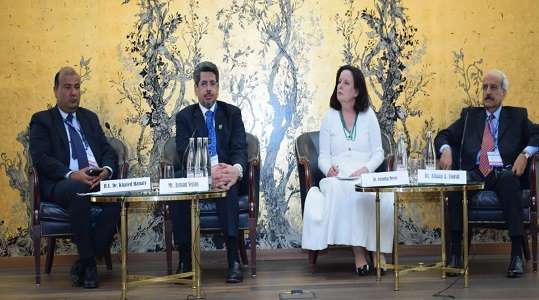During his participation in the activities of the Arab International Banking Summit 2022, the Secretary-General of the Union of Arab Chambers, Dr. Khaled Hanafi, called on the countries of the European Union and the Federal Republic of Germany, to adopt a new policy with the Arab world, including the Arab Republic of Egypt, by directing more attention to our Arab region instead of limiting its interests to specific countries, especially in light of the events that swept the world, not least of which was the Russian-Ukrainian war, which made it imperative for European countries to strengthen, consolidate and strengthen their economic relations with the Arab world, raising the level and volume of cooperation to the level of strategic partnership, by maximizing partnership in the field of technology, as well as promoting investments in the food and agricultural industries, which contributes to the achievement of mutual benefit.
Hanafi noted that the event will be held in Frankfurt, "which is the center of finance and business in Germany, and the headquarters of the European Central Bank and the German Federal Bank."
The event, organized by the Union of Arab Banks during the period June 20-21, in the city of Frankfurt in the Federal Republic of Germany, was attended by German Finance Minister Christian Lindner, the Minister of Planning in the Arab Republic of Egypt, Dr. Hala Al-Saeed, and the President of the Union of Arab Banks, Muhammad Al-Etrebi, in addition to official, financial and economic figures from Arab and foreign countries.
Hanafi stressed that "The current global challenges represent a decisive moment in the reconfiguration of the geopolitical order, as the disruption of international relations will have profound repercussions on Europe and the world, evidence that a new global balance of power is in the process of formation."
He explained that “The war in Ukraine and the sanctions associated with it, led to a sharp rise in the prices of basic commodities, which will increase the challenges facing the Arab countries, especially the oil-importing countries in the region, after the price of a barrel of global oil recorded huge jumps, in addition to a 14 percent increase in food prices, after reaching record levels in 2021. While inflation will remain high in the region this year at 14 percent. Furthermore, freight costs can be expected to rise further, including land, sea and air freight.”
He said, “The pandemic has turned our lives and our economies upside down and is not over yet. The war in Europe is also sending shockwaves around the world. These dual crises are further complicated by another growing danger, which is the fragmentation of the global economy into geopolitical blocs of different commercial and technological parameters. This will entail painful adjustment costs, as supply chains, research and development and production networks will be broken and need to be rebuilt, which will also limit the ability to meet other global challenges, such as the existential threat of climate change.”
Hanafi considered that “Containing inflation is a key priority, despite the fragile recoveries. In order to meet the inflation challenge, central banks must act decisively, keep their finger on the pulse of the economy and adjust policy appropriately. It is also essential that countries address food security risks and mitigate the impact of high international prices on the poor. As for countries with high debt, these measures should be accompanied by balancing measures, for example, reducing unnecessary spending and promoting additional tax equity to protect debt sustainability with limited fiscal space.”
He stressed that "The challenges facing the world today necessitate the need to move forward with structural reforms, which will help countries withstand future macroeconomic shocks and accelerate recovery, for this, it is necessary to adopt measures that enhance the efficiency of government spending and revenue collection, by promoting digitization, strengthening private sector activity and strengthening social safety nets.”
Source (Union of Arab Chambers)

